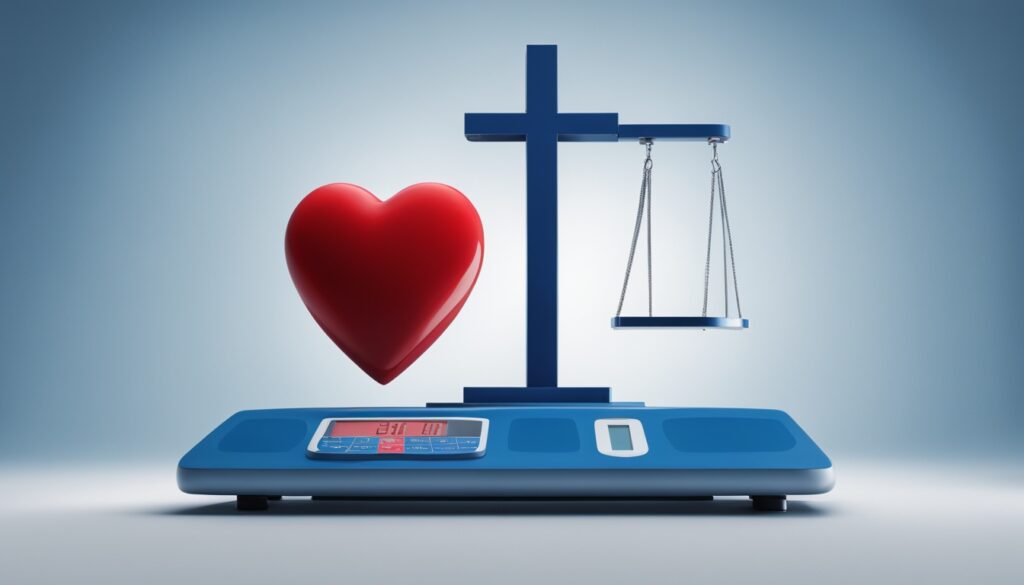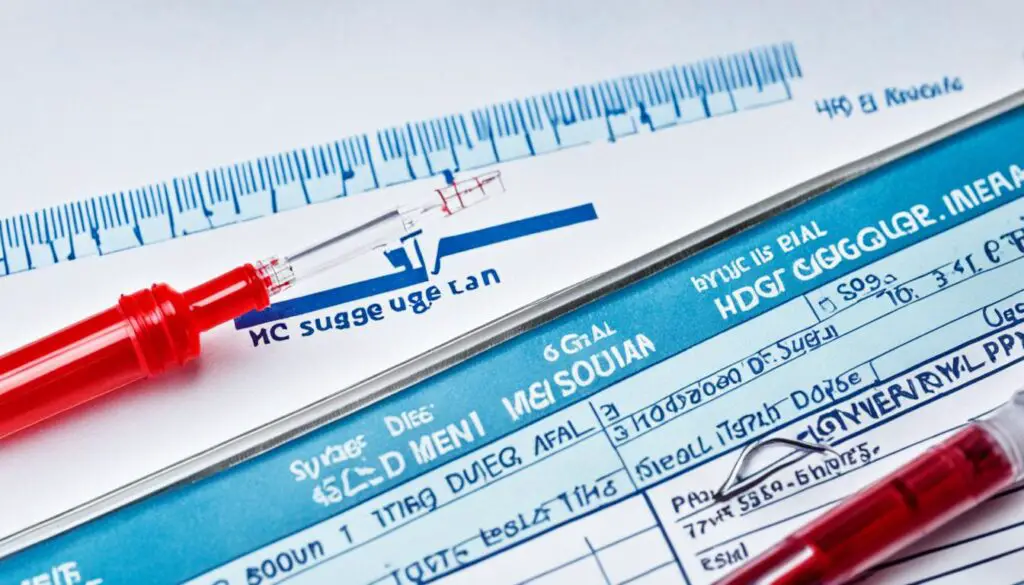Did you know that the HCG diet, a popular weight-loss trend, is potentially risky for individuals with diabetes? The severe calorie restriction and the effects of HCG (human chorionic gonadotropin) on blood sugar levels can pose significant dangers for diabetics. Understanding the risks and precautions of the HCG diet is crucial for those managing diabetes and seeking safe and effective methods of weight loss.
Key Takeaways:
- The HCG diet is not recommended for diabetics due to its severe calorie restriction and potential effects on blood sugar levels.
- Obesity is strongly linked to type II diabetes, making weight loss an important consideration for managing the condition.
- There is insufficient scientific evidence to support the claims that the HCG diet can reverse type II diabetes.
- Healthcare professionals unanimously agree that the HCG diet is not safe and can lead to nutrient deficiencies and disordered eating behaviors.
- Safer alternatives for weight loss and diabetes management include a balanced diet, regular exercise, and personalized healthcare guidance.
What is the HCG diet?
The HCG diet is a very low-calorie diet that typically ranges from 500 to 800 calories per day. It is accompanied by supplemental HCG injections, which are claimed to stimulate weight loss. The diet was popularized in the 1950s by Albert Simeons, a British endocrinologist.
Simeons suggested that HCG allows the body to burn stored fat instead of muscle, leading to rapid weight loss. However, it is important to note that there is no scientific evidence to support these claims, and the FDA does not approve the use of HCG for weight loss.
The HCG diet typically involves a restricted food list that excludes high-calorie foods and emphasizes lean protein, vegetables, and limited fruit portions. Followers of the HCG diet are advised to limit their daily calorie intake and consume small meals throughout the day.
While the HCG diet gained popularity due to the potential for quick weight loss, it is important to consider the potential risks and lack of scientific evidence supporting its effectiveness. In the next section, we will discuss the safety considerations for diabetics who may be considering the HCG diet.
The Origins of the HCG Diet
Albert Simeons, a British endocrinologist, first proposed the idea of using HCG injections to promote weight loss in the 1950s. His book “Pounds and Inches: A New Approach to Obesity” outlined the principles of the HCG diet and its potential benefits. However, it is essential to note that Simeons’ work has since been heavily criticized for its lack of scientific evidence and the unproven claims made about HCG’s effects on weight loss.
Understanding the Very Low-Calorie Diet
The HCG diet falls into the category of very low-calorie diets (VLCDs) due to its severely restricted calorie intake. VLCDs are typically defined as diets that provide fewer than 800 calories per day. The low calorie content of the HCG diet is intended to force the body to use stored fat as an energy source, leading to rapid weight loss.
However, it is essential to approach VLCDs with caution, as they can pose health risks and are not suitable for everyone. VLCDs may lead to nutrient deficiencies, fatigue, muscle loss, and a slow metabolism. It is crucial to consult with a healthcare professional before embarking on any restrictive diet, including the HCG diet.
The Role of HCG Injections
The HCG hormone, human chorionic gonadotropin, is a hormone produced during pregnancy. In the context of the HCG diet, supplemental HCG injections are administered to supposedly enhance weight loss by suppressing appetite and targeting stubborn fat stores.
However, it is important to note that there is no scientific evidence to support the notion that HCG injections aid weight loss. The FDA has also expressed concerns about the safety and legality of over-the-counter HCG products, stating that they are illegal and have not been proven to be effective for weight loss.
| Pros of the HCG Diet | Cons of the HCG Diet |
|---|---|
| 1. Potential for rapid weight loss | 1. Severe calorie restriction can lead to nutrient deficiencies |
| 2. May provide a jumpstart for individuals struggling with weight loss | 2. Lack of scientific evidence supporting its effectiveness |
| 3. May promote healthier eating habits and portion control | 3. Potential risks and side effects, especially for diabetics |
Is the HCG diet safe for diabetics?
The HCG diet is not recommended for diabetics. The severe calorie restriction of the diet, combined with the potential effects of HCG on blood sugar levels, can be risky for individuals with diabetes.
The HCG diet involves severely restricting calorie intake, typically ranging from 500 to 800 calories per day. This level of calorie restriction can disrupt the delicate balance of blood sugar control in diabetics, potentially leading to unstable blood sugar levels and complications.
Additionally, the effects of HCG on blood sugar levels are not well understood. HCG has been shown to have similar properties to certain hormones that affect blood sugar, which may further contribute to the risk of instability in individuals with diabetes.
Moreover, the HCG diet places diabetics at an increased risk of nutrient deficiencies. With limited food choices and severely restricted calories, it can be challenging to obtain all the necessary nutrients for optimal health. Diabetics already face an increased risk of certain nutrient deficiencies, such as vitamins B12 and D, and adding a restrictive diet like the HCG diet can worsen these deficiencies.
Another consideration is the long-term sustainability of the HCG diet for diabetics. Weight management is crucial for diabetes management, and it is important to find a sustainable approach that can be maintained over time. The HCG diet’s severe calorie restriction and limited food choices may not be feasible in the long term, making it difficult for diabetics to continue managing their weight effectively.
Given these factors, it is essential for diabetics to work closely with their healthcare provider to develop a safe and effective weight loss plan. A personalized approach that considers the unique needs and challenges of diabetes management is crucial. Healthcare professionals can help diabetics navigate the complexities of weight loss while prioritizing blood sugar control and overall health.
It is important to remember that there are alternative methods for weight loss and diabetes management that are safer and more sustainable. A balanced diet that incorporates a variety of nutrient-rich foods, along with regular exercise, is key to long-term success.
The link between obesity and type II diabetes

Obesity and type II diabetes share a strong connection, making weight management crucial for preventing and managing this chronic condition. In individuals who are overweight or obese, excess body fat can lead to insulin resistance and higher blood sugar levels, both of which are key drivers of type II diabetes. Insulin resistance occurs when the body’s cells become less responsive to insulin, the hormone responsible for regulating blood sugar.
As the body develops resistance to insulin, blood sugar levels rise, leading to the development of type II diabetes. This condition is characterized by high blood sugar levels and an impaired ability to effectively utilize insulin. Long-term, uncontrolled diabetes can result in severe complications, such as heart disease, kidney damage, and nerve damage.
Addressing obesity and maintaining a healthy weight is essential for reducing the risk of developing type II diabetes. Weight loss can improve insulin sensitivity, making it easier for cells to utilize glucose and maintain stable blood sugar levels. Lifestyle changes, such as adopting a balanced diet and engaging in regular physical activity, are effective strategies for achieving sustainable weight loss, managing diabetes, and lowering the risk of associated complications.
| Obesity and Type II Diabetes | Key Points |
|---|---|
| Obesity |
|
| Type II Diabetes |
|
| Prevention and Management |
|
By understanding the link between obesity and type II diabetes, individuals can take proactive steps towards better health. Embracing a healthy lifestyle that includes proper nutrition, regular physical activity, and weight management is paramount for reducing the risk of developing diabetes and promoting overall well-being.
Can the HCG diet help reverse type II diabetes?
While there are claims that the HCG diet can help reverse type II diabetes, it’s important to note that scientific evidence supporting this is lacking. However, healthcare professionals have observed that weight loss, dietary changes, and exercise habits can lead to improvements in blood sugar stabilization and potentially reverse the disease process.
Long-term commitment is essential when undertaking these changes and aiming for diabetes reversal. Close monitoring by a healthcare provider is crucial to ensure safety and effectiveness.
Weight loss is a key component of managing type II diabetes. By shedding excess pounds, individuals with diabetes can enhance blood sugar control and reduce the need for medication. The HCG diet’s restricted calorie intake may lead to weight loss, but it is essential to approach it cautiously.
Implementing a sustainable weight loss plan is fundamental for long-term success. This includes making gradual dietary changes such as prioritizing whole, nutrient-dense foods and reducing processed foods and added sugars. Regular physical activity, tailored to one’s abilities and preferences, is also crucial for weight management and overall health.
I have seen patients achieve significant improvements in blood sugar stabilization and experience positive changes in their diabetes management through sustained weight loss, exercise, and dietary modifications. However, it is essential for individuals with diabetes to approach weight loss strategies with caution and in collaboration with their healthcare provider.
By focusing on a holistic approach to diabetes management, including sustainable weight loss methods, blood sugar stabilization becomes an achievable goal. This can lead to an improved quality of life and reduced reliance on diabetes medications.
Benefits of Weight Loss in Diabetes Management
Weight loss can have numerous benefits for individuals with type II diabetes:
- Better blood sugar control
- Reduced insulin resistance
- Lowered risk of diabetes-related complications
- Improved cardiovascular health
- Enhanced overall well-being
While weight loss is beneficial, it’s important to remember that it requires a long-term commitment. The HCG diet’s severe calorie restriction may provide initial results, but its sustainability and potential long-term effects on diabetes management are questionable.
Working closely with healthcare professionals, individuals can develop personalized weight loss plans that prioritize both short-term benefits and long-term health outcomes.
Experts’ opinion on the safety of the HCG diet

When it comes to the safety of the HCG diet, registered dietitians and healthcare professionals unanimously share their concerns. It is widely agreed upon that the HCG diet is not safe and should not be recommended as a weight loss method.
The HCG diet is known for its highly restrictive nature, which involves severe calorie restriction and limited food choices. This can lead to nutrient deficiencies, as the body may not receive an adequate amount of essential vitamins, minerals, and macronutrients. These deficiencies can have detrimental effects on overall health and well-being.
Moreover, the HCG diet has been associated with the development of disordered eating behaviors. The extreme restrictions and focus on rapid weight loss can contribute to unhealthy relationships with food and negative psychological effects. Fatigue, irritability, and depression are some of the common side effects reported by individuals following the HCG diet.
While rapid weight loss may occur initially, it is important to note that the sustainability of this weight loss is questionable. Once the severe calorie restriction is discontinued, there is a high likelihood of weight regain. This cycle of weight loss and regain can have negative impacts on both physical and mental health.
“The HCG diet is not a safe or sustainable method for weight loss. It puts individuals at risk of nutrient deficiencies and disordered eating behaviors, which can have long-term consequences. It is important to prioritize a balanced and nutritious diet for safe and effective weight loss.” – Dr. Sarah Johnson, Registered Dietitian
The FDA has also reported serious adverse reactions associated with the HCG diet. These adverse reactions reinforce the concerns raised by experts regarding the safety of this diet.
| Expert | Opinion |
|---|---|
| Dr. Emily Anderson | “The HCG diet poses significant risks, including nutrient deficiencies and the potential for disordered eating behaviors. It is crucial to explore safer and more sustainable weight loss methods.” |
| Dr. Michael Thompson | As healthcare professionals, we advise against the use of the HCG diet due to its restrictive nature and potential side effects. It is essential to prioritize individualized and evidence-based approaches to weight loss. |
| Dr. Jennifer Davis | “Nutrient deficiencies and disordered eating behaviors are major concerns with the HCG diet. Promoting long-term health and well-being requires a comprehensive and balanced approach to weight management.” |
Considering the collective opinion of experts and the documented risks associated with the HCG diet, it is evident that this diet should be avoided. Safer and more effective alternatives, such as a balanced diet and regular exercise, should be pursued for long-term weight loss and overall health improvement.
Potential risks of the HCG diet for diabetics
The HCG diet, with its severe calorie restriction, poses additional risks for individuals with diabetes. One of the main concerns is the potential impact on blood sugar levels. The limited food choices on this diet can lead to unstable blood sugar levels, making it challenging for diabetics to manage their condition effectively. Blood sugar fluctuations can have serious implications for overall health and well-being.
Furthermore, the HCG diet’s restrictive nature can increase the risk of nutrient deficiencies, which are particularly worrisome for individuals with diabetes. Proper nutrient intake is essential for managing diabetes and preventing complications. The HCG diet’s limited food options may make it difficult to obtain all the necessary nutrients, thereby jeopardizing the individual’s health.
“The HCG diet’s severe calorie restriction and limited food choices can disrupt blood sugar control and increase the risk of nutrient deficiencies, posing significant health risks for diabetics.” – Dr. Sarah Johnson, Endocrinologist.
In addition to blood sugar and nutrient concerns, diabetics undertaking the HCG diet may experience potential side effects. The extreme calorie restriction can lead to fatigue, irritability, and even depression. These psychological and emotional effects can further impact the individual’s well-being and overall quality of life.
There is also a potential risk of thromboembolism, which is the formation of blood clots, as a result of the HCG diet. Blood clots can cause serious complications, including stroke or heart attack. Diabetics, who are already at a higher risk for cardiovascular issues, must carefully consider the potential risks and consult with a healthcare professional before embarking on the HCG diet.
Considering all these potential risks, it is crucial for diabetics to prioritize their health and seek guidance from their healthcare professionals. Consulting with an experienced healthcare provider can ensure that weight loss methods are safe, effective, and well-suited to the individual’s specific needs and diabetes management requirements.
Potential Risks of the HCG Diet for Diabetics
| Risks | Explanation |
|---|---|
| Unstable Blood Sugar Levels | Severe calorie restriction can lead to fluctuations in blood sugar levels, making it challenging for diabetics to manage their condition effectively. |
| Nutrient Deficiencies | The limited food choices on the HCG diet can increase the risk of nutrient deficiencies, which are particularly concerning for individuals with diabetes. |
| Side Effects | Potential side effects of the HCG diet include fatigue, irritability, and depression, which can impact the individual’s well-being and quality of life. |
| Thromboembolism Risk | There is a potential risk of thromboembolism, the formation of blood clots, which can lead to serious complications in individuals with diabetes. |
The FDA’s stance on over-the-counter HCG products

The FDA has issued a warning regarding over-the-counter HCG weight-loss products. These products are both illegal and have not been proven to be safe or effective for weight loss. The sale of over-the-counter HCG products is in violation of the law, and the FDA has reported serious adverse reactions associated with their use.
It is crucial to prioritize safety and only use FDA-approved medications for weight loss. Seeking guidance from healthcare professionals is essential when considering weight-loss options to ensure both effectiveness and safety.
The lack of safety in over-the-counter HCG diet products is a significant concern. The FDA warns against their use due to the risks they pose to consumers’ health. By choosing to rely on FDA-approved medications and working with healthcare professionals, individuals can make informed decisions and protect their well-being.
Healthier alternatives for weight loss and diabetes management

When it comes to weight loss and diabetes management, there are safe and effective methods that far surpass the risks and limitations of the HCG diet. A holistic approach that focuses on a balanced diet, regular exercise, and targeted diabetes management strategies offers a sustainable path towards achieving health and well-being. It is crucial to collaborate with healthcare professionals, such as doctors and registered dietitians, to develop personalized strategies tailored to individual needs and priorities.
Safe weight loss methods
Instead of resorting to extreme calorie restriction, it is advisable to adopt safe weight loss methods that promote long-term success. A gradual and steady approach that aims for a loss of 1-2 pounds per week is considered optimal and manageable. This can be achieved by creating a calorie deficit through portion control, selecting whole foods, and incorporating regular physical activity into the daily routine.
Balanced diet
A balanced diet plays a pivotal role in weight loss and diabetes management. It should include a variety of nutrient-rich foods such as fruits, vegetables, whole grains, lean proteins, and healthy fats. Emphasizing portion control and mindful eating practices can help regulate blood sugar levels, promote satiety, and maintain overall well-being.
Regular exercise
Physical activity is not only beneficial for weight loss but also vital for managing diabetes. Engaging in regular exercise, such as aerobic activities, strength training, and flexibility exercises, can improve insulin sensitivity, lower blood sugar levels, and support overall cardiovascular health. It is recommended to aim for at least 150 minutes of moderate-intensity exercise per week, spread across several days.
Diabetes management strategies
For individuals with diabetes, incorporating specific management strategies is essential. This includes regular monitoring of blood sugar levels, adhering to medication and insulin regimens as prescribed, implementing carbohydrate counting and glycemic index awareness, and participating in diabetes education programs. Consulting with healthcare professionals who specialize in diabetes management can provide valuable guidance and support throughout the process.
| Safe Weight Loss Methods | Balanced Diet | Regular Exercise | Diabetes Management Strategies |
|---|---|---|---|
| Gradual and steady approach | Variety of nutrient-rich foods | Aerobic activities | Regular blood sugar monitoring |
| Portion control and mindful eating | Portion control and mindful eating | Strength training | Adherence to medication and insulin regimens |
| Selection of whole foods | Emphasis on fruits, vegetables, whole grains | Flexibility exercises | Carbohydrate counting and glycemic index awareness |
The importance of individualized healthcare guidance

When it comes to weight loss strategies, especially for individuals with underlying health conditions such as diabetes, individualized healthcare guidance is crucial. Working closely with healthcare providers, such as doctors and registered dietitians, ensures that your weight loss plan is personalized, safe, and effective.
Through personalized healthcare guidance, you can receive recommendations tailored to your specific needs and goals. Your healthcare provider will take into account factors such as your medical history, current health status, lifestyle, and preferences to create a personalized weight loss plan that suits you.
Medical supervision is essential during your weight loss journey. Your healthcare provider will closely monitor your progress, making adjustments to your plan if necessary. Regular check-ins and consultations allow them to track your success and address any concerns or challenges that may arise.
Having a healthcare provider as part of your weight loss journey means you have a trusted professional to turn to for support and guidance. They can provide valuable insights, answer your questions, and help you stay motivated throughout the process.
Individualized healthcare guidance goes beyond just the weight loss aspect. For individuals with diabetes, it is important to consider how weight loss may impact your blood sugar levels and overall diabetes management. Your healthcare provider can provide specific diabetic considerations and tailor your weight loss plan accordingly, helping you navigate potential challenges and minimize risks.
By prioritizing individualized healthcare guidance, you are taking proactive steps towards achieving your weight loss goals while ensuring your overall health and well-being are not compromised.
Benefits of individualized healthcare guidance for weight loss:
- Personalized recommendations based on your unique needs and goals
- Regular monitoring and adjustment of your weight loss plan
- Access to professional support and guidance throughout your journey
- Consideration of any underlying health conditions, such as diabetes
- Minimization of potential risks and complications
Remember, achieving and maintaining a healthy weight requires a comprehensive approach that takes into account your individual circumstances. By partnering with a healthcare provider, you can develop a personalized weight loss plan that is safe, effective, and sustainable.
Conclusion
The HCG diet is not considered safe or effective for diabetics. Severe calorie restriction, potential nutrient deficiencies, and the risks associated with the HCG diet pose significant concerns for individuals with diabetes.
Research has shown that safer and more sustainable methods of weight loss and diabetes management, such as a balanced diet and regular exercise, are recommended. It is crucial for diabetics to prioritize individualized healthcare guidance and work closely with healthcare professionals to develop personalized strategies for weight loss and diabetes management.
By focusing on a comprehensive approach that combines a balanced diet, regular exercise, and medical supervision, individuals with diabetes can achieve their weight loss goals while also effectively managing their condition and promoting overall health and well-being.
FAQ
Is the HCG diet safe for diabetics?
The HCG diet is not recommended for diabetics due to the severe calorie restriction and potential effects on blood sugar levels. It is important for diabetics to work closely with their healthcare provider to develop a safe and effective weight loss plan.
What is the HCG diet?
The HCG diet is a very low-calorie diet that typically ranges from 500 to 800 calories per day. It is accompanied by supplemental HCG injections, which are claimed to stimulate weight loss. However, there is no scientific evidence to support these claims, and the FDA does not approve the use of HCG for weight loss.
Can the HCG diet help reverse type II diabetes?
There are claims that the HCG diet can help reverse type II diabetes, but scientific evidence is lacking. Weight loss, dietary changes, and exercise have been observed to improve blood sugar stabilization and the disease process. However, these changes require a long-term commitment and close monitoring by a healthcare provider.
What is the link between obesity and type II diabetes?
Obesity increases the risk of developing type II diabetes due to factors such as insulin resistance and higher blood sugar levels. Obesity prevention and weight loss are important for reducing the risk of developing type II diabetes.
What do experts say about the safety of the HCG diet?
Registered dietitians and healthcare professionals unanimously agree that the HCG diet is not safe and should not be recommended. The diet is highly restrictive and can lead to nutrient deficiencies and the development of disordered eating behaviors. Rapid weight loss may occur initially, but it is not sustainable, and there are risks of fatigue, irritability, depression, and potential for weight regain.
What are the potential risks of the HCG diet for diabetics?
The HCG diet poses additional risks for diabetics, including unstable blood sugar levels due to severe calorie restriction. The diet’s limited food choices can increase the risk of nutrient deficiencies, which are particularly concerning for individuals with diabetes. Diabetics may also experience side effects such as fatigue, irritability, depression, and potential complications like thromboembolism.
What is the FDA’s stance on over-the-counter HCG products?
The FDA has warned against the use of over-the-counter HCG weight-loss products. These products are illegal and have not been proven to be safe or effective for weight loss. Companies selling over-the-counter HCG products are breaking the law, and the FDA has reported serious adverse reactions associated with these products.
What are healthier alternatives for weight loss and diabetes management?
Safer and more effective methods for weight loss and diabetes management include a balanced diet that includes a variety of nutrient-rich foods, regular exercise, and lifestyle modifications. It is important to work with healthcare professionals, such as doctors and registered dietitians, to develop personalized strategies that prioritize long-term health and well-being.
Why is individualized healthcare guidance important?
Individualized healthcare guidance is crucial when considering weight loss strategies, especially for individuals with underlying health conditions such as diabetes. Working closely with healthcare providers ensures that weight loss plans prioritize safety and effectiveness. These professionals can provide personalized recommendations, monitor progress, and address any potential health risks or concerns.




